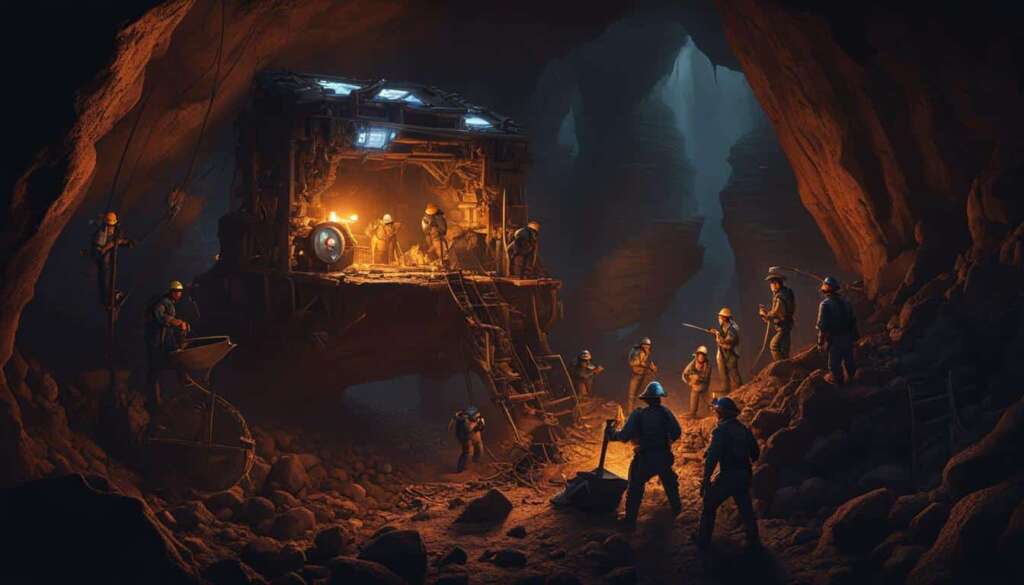Table of Contents
Bitcoin mining is the process of verifying transactions and securing the Bitcoin network. It involves solving complex mathematical problems that require significant computing power. Miners compete to solve these problems, and the first one to solve it receives a reward in the form of newly created Bitcoins. This process ensures that new coins are minted at a steady rate and that all transactions are verified and secure.
In this article, we will provide a comprehensive understanding of the core concepts behind bitcoin mining, including its purpose, process, and significance in securing the cryptocurrency. We will delve into the technical aspects of how mining works, the role of miners in maintaining the blockchain ledger, and the benefits of decentralized mining for the overall security of the cryptocurrency ecosystem. By the end of this article, you will have a better grasp of the essential components of bitcoin mining and its importance in the broader cryptocurrency landscape.
Key Takeaways
- The purpose of bitcoin mining is to validate transactions and secure the Bitcoin network
- Miners solve complex mathematical problems to verify transactions and receive new Bitcoins as a reward
- Mining plays a crucial role in ensuring the security and integrity of the cryptocurrency ecosystem
- Decentralized mining is beneficial for the overall security of the cryptocurrency network
- The mining landscape is constantly evolving and facing new challenges and developments
How Does Bitcoin Mining Work?
Bitcoin mining is a complex process that involves solving complex mathematical problems to verify and validate the transactional data on the blockchain ledger. The process ensures that the distributed ledger system remains secure, immutable, and transparent, avoiding any chances of fraud or illicit activities.
The mining process begins when a miner downloads a copy of the entire blockchain ledger and starts verifying transactions by solving complex puzzles. These puzzles require a high level of computational power and energy, with the miner having to identify the nonce – a unique identifier – that satisfies the set rules for the current transaction block.
Once the nonce has been identified, the miner broadcasts the solution to the network for validation by other miners. This process is known as proof of work and requires the consensus of the majority of miners for the solution to be added to the blockchain ledger.
The successful miner is rewarded with a specified amount of bitcoin, known as the block reward. This reward serves as an incentive to ensure that miners continue to contribute to the network’s overall security.
The mining difficulty level is adjusted after every 2016 blocks to maintain a constant average rate of mining. This adjustment ensures that new blocks are added to the blockchain ledger roughly every ten minutes, providing a consistent stream of validated transactions and further strengthening the network.
While the Bitcoin mining process is aimed at providing security and incentivising miners to maintain the blockchain ledger, it also has negative implications, such as high energy consumption and the centralization of mining activities in certain regions. However, the benefits of Bitcoin mining far outweigh these concerns, as it provides a secure, decentralized, and transparent network that allows individuals to transfer value without the need for intermediaries.
The Role of Mining in Cryptocurrency Security
The security and integrity of the Bitcoin network rely heavily on the process of mining. Mining plays a critical role in creating new bitcoins, validating transactions, and maintaining the blockchain ledger. However, it is the security aspect of mining that comprises its most important function in cryptocurrency.
Bitcoin mining security involves the prevention of fraudulent activity and double-spending attacks. To ensure the security of the network, miners must solve complex mathematical equations and reach a consensus on which transactions to validate. This consensus mechanism, also known as proof of work, makes it incredibly difficult for malicious actors to manipulate the blockchain history.
Moreover, the decentralized nature of mining makes it more challenging for attackers to breach the system. With a distributed network of miners verifying transactions, there is no single point of failure that a hacker could exploit. Instead, miners work together to secure the blockchain, increasing the overall security of the cryptocurrency ecosystem.
“The security of the Bitcoin network rests on the validation and confirmation of transactions, which is accomplished through a process known as mining.” – Andreas Antonopoulos
In summary, the security of the Bitcoin network depends on the integrity of its mining process. Through consensus mechanisms, proof of work, and decentralized mining, the Bitcoin network remains secure against fraudulent activity and maintains its status as a trusted cryptocurrency.
Conclusion
In conclusion, understanding the essentials of bitcoin mining is crucial for comprehending the cryptocurrency ecosystem. Through this article, we have explored the core concepts behind mining, including its purpose, process, and significance in securing the cryptocurrency.
We have discussed the technical aspects of bitcoin mining, such as the process of solving complex mathematical problems, the role of miners in maintaining the blockchain ledger, and the reward system associated with successful mining.
Furthermore, we have emphasised the crucial role that mining plays in ensuring the security and integrity of the Bitcoin network. We have explored concepts such as consensus mechanisms, proof of work, and the prevention of double-spending attacks. We have also highlighted the benefits of decentralized mining for the overall security of the cryptocurrency ecosystem.
In conclusion, bitcoin mining continues to be an integral part of the blockchain system. As we move forward, the mining landscape will continue to evolve, presenting new challenges and opportunities for miners and cryptocurrency enthusiasts alike.
FAQ
What is bitcoin mining?
Bitcoin mining is the process of validating transactions and adding them to the blockchain, which is the decentralized ledger of all bitcoin transactions. Miners solve complex mathematical problems to verify the authenticity of transactions and are rewarded with newly created bitcoins for their work.
How does bitcoin mining work?
Bitcoin mining involves solving complex mathematical problems using specialized hardware, known as mining rigs, and software. Miners compete to find the solution to these problems, and the first miner to successfully solve the puzzle earns the right to add a new block of transactions to the blockchain. This process requires significant computational power and energy consumption.
Why is mining important for cryptocurrency security?
Mining plays a vital role in ensuring the security and integrity of the cryptocurrency network. It helps to validate and secure transactions, prevent fraud and double-spending, and maintain the decentralization of the system. The process of mining, specifically proof of work, makes it extremely difficult for anyone to control or manipulate the blockchain, making it resistant to attacks and maintaining trust among users.
What are the benefits of decentralized mining?
Decentralized mining contributes to the overall security of the cryptocurrency ecosystem. It ensures that no single entity or group can gain control over the network, minimizing the risk of manipulation or censorship. Decentralization also promotes competition among miners, leading to a more robust and secure network.
What is the reward for mining bitcoin?
Miners are rewarded with newly minted bitcoins for successfully mining a new block and adding it to the blockchain. This reward serves as an incentive for miners to dedicate their computational power and resources to secure the network. Additionally, miners also receive transaction fees associated with the transactions included in the block they mine.
Will mining always be profitable?
The profitability of mining depends on several factors, including the price of bitcoin, the cost of electricity, and the efficiency of mining hardware. As the competition among miners increases and the mining difficulty rises, it becomes more challenging to make a profit. It’s important to carefully consider these factors before investing in mining equipment and operations.
How does mining impact the environment?
Mining bitcoin requires a substantial amount of energy, and therefore, it has an environmental impact. The energy consumption associated with mining has raised concerns about carbon emissions and sustainability. However, it’s worth noting that the industry has been working towards developing more energy-efficient mining solutions and exploring renewable energy sources to minimize its environmental footprint.












